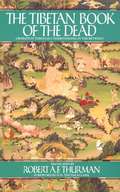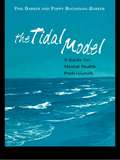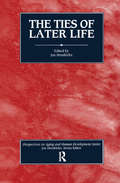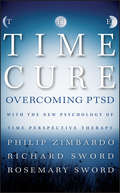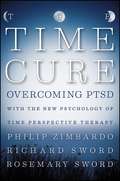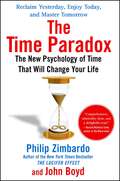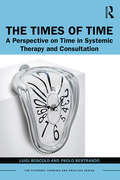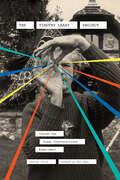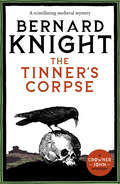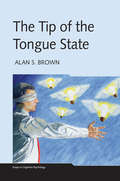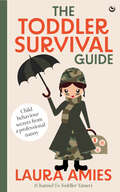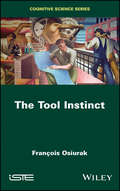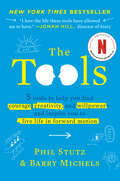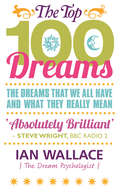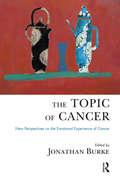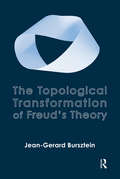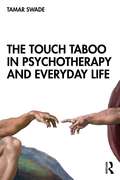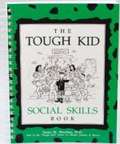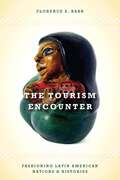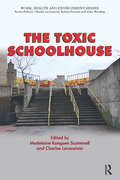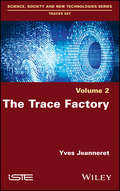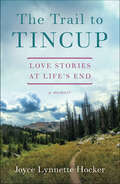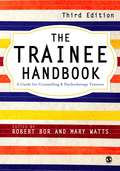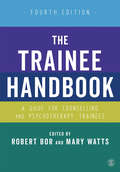- Table View
- List View
The Tibetan Book of the Dead
by Robert A. Thurman Padma SambhavaThe expert on Tibetan Buddhism in the West offers a translation of this book of Tibetan philosophy that captures the true spirit and poetry of the original book that reveals the nature of the mind and its manifestations and offers pure enlightenment.
The Tidal Model: A Guide for Mental Health Professionals
by Poppy Buchanan-Barker Prof Philip BarkerThe Tidal Model represents a significant alternative to mainstream mental health theories, emphasising how those suffering from mental health problems can benefit from taking a more active role in their own treatment. Based on extensive research, The Tidal Model charts the development of this approach, outlining the theoretical basis of the model to illustrate the benefits of a holistic model of care which promotes self-management and recovery. Clinical examples are also employed to show how, by exploring rather than ignoring a client's narrative, practitioners can encourage the individual's greater involvement in the decisions affecting their assessment and treatment. The appendices guide the reader in developing their own assessment and care plans. The Tidal Model's comprehensive coverage of the theory and practice of this model will be of great use to a range of mental health professionals and those in training in the fields of mental health nursing, social work, psychotherapy, clinical psychology and occupational therapy.
The Ties of Later Life (Perspectives On Aging And Human Development Ser.)
by Jon HendricksHelps you recognise the continuity that runs across the generations from grandparents to grandchildren. This work provides a clear perspective on the actual experiences of the lives of our family and friends.
The Time Cure: Overcoming PTSD with the New Psychology of Time Perspective Therapy
by Philip Zimbardo Richard Sword Rosemary SwordIn his landmark book, The Time Paradox, internationally known psychologist Philip Zimbardo showed that we can transform the way we think about our past, present, and future to attain greater success in work and in life. Now, in The Time Cure, Zimbardo has teamed with clinicians Richard and Rosemary Sword to reveal a groundbreaking approach that helps those living with post-traumatic stress disorder (PTSD) to shift their time perspectives and move beyond the traumatic past toward a more positive future. Time Perspective Therapy switches the focus from past to present, from negative to positive, clearing the pathway for the best yet to come: the future. It helps PTSD sufferers pull their feet out of the quicksand of past traumas and step firmly on the solid ground of the present, allowing them to take a step forward into a brighter future. Rather than viewing PTSD as a mental illness the authors see it as a mental injury—a normal reaction to traumatic events—and offer those suffering from PTSD the healing balm of hope. The Time Cure lays out the step-by-step process of Time Perspective Therapy, which has proven effective for a wide range of individuals, from veterans to survivors of abuse, accidents, assault, and neglect. Rooted in psychological research, the book also includes a wealth of vivid and inspiring stories from real-life PTSD sufferers—effective for individuals seeking self-help, their loved ones, therapists and counselors, or anyone who wants to move forward to a brighter future.
The Time Cure: Treating PTSD with the New Psychology of Time Perspective Therapy
by Philip Zimbardo Richard M. Sword Rosemary K. M. SwordZimbardo shows how those living with PTSD can shift their perspectives to change the way they think about past traumatic experiences, get away from a fatalistic mindset, and focus more on a positive future.
The Time Paradox: The New Psychology of Time That Will Change Your Life
by Philip Zimbardo John BoydYour every significant choice -- every important decision you make -- is determined by a force operating deep inside your mind: your perspective on time -- your internal, personal time zone. This is the most influential force in your life, yet you are virtually unaware of it. Once you become aware of your personal time zone, you can begin to see and manage your life in exciting new ways. In The Time Paradox, Drs. Zimbardo and Boyd draw on thirty years of pioneering research to reveal, for the first time, how your individual time perspective shapes your life and is shaped by the world around you. Further, they demonstrate that your and every other individual's time zones interact to create national cultures, economics, and personal destinies. You will discover what time zone you live in through Drs. Zimbardo and Boyd's revolutionary tests. Ask yourself: * Does the smell of fresh-baked cookies bring you back to your childhood? * Do you believe that nothing will ever change in your world? * Do you believe that the present encompasses all and the future and past are mere abstractions? * Do you wear a watch, balance your checkbook, and make to-do lists -- every day? * Do you believe that life on earth is merely preparation for life after death? * Do you ruminate over failed relationships? * Are you the life of every party -- always late, always laughing, and always broke? These statements are representative of the seven most common ways people relate to time, each of which, in its extreme, creates benefits and pitfalls. The Time Paradox is a practical plan for optimizing your blend of time perspectives so you get the utmost out of every minute in your personal and professional life as well as a fascinating commentary about the power and paradoxes of time in the modern world. No matter your time perspective, you experience these paradoxes. Only by understanding this new psychological science of time zones will you be able to overcome the mental biases that keep you too attached to the past, too focused on immediate gratification, or unhealthily obsessed with future goals. Time passes no matter what you do -- it's up to you to spend it wisely and enjoy it well. Here's how.
The Times of Time: A Perspective on Time in Systemic Therapy and Consultation (The Systemic Thinking and Practice Series)
by Paolo Bertrando Luigi BoscoloThis is the most comprehensive study of the role of time in psychotherapy. It illustrates how time is experienced in different ways – individual time, family time, and social time – and how time can act as an invaluable metaphor in shaping clinical practice within a systemic approach, while maintaining connections with other approaches, such as psychoanalysis and cognitive therapies. A seminal volume on this topic, the book looks at issues such as the duration of therapy; the relevance of past, present, and future in therapy; and the balance of memory and oblivion. It also includes a discussion of how time is framed in other disciplines, including sociology, history, and psychopathology, whilst exploring the concept in practical terms through case vignettes and complete case histories, including the transcripts of actual sessions. The reader is thus given a set of guidelines for dealing with time issues in therapy from a systemic perspective. Originally published in 1993, the book has been updated to create a dialogue with contemporary theoretical debates, as well as social and technological changes. It will fascinate all psychotherapists, particularly those interested in a systemic practice.
The Timothy Leary Project: Inside the Great Counterculture Experiment
by Jennifer UlrichThe life of Timothy Leary is examined through papers and correspondence preserved in his archive.The first collection of Timothy Leary’s (1920–1996) selected papers and correspondence opens a window on the ideas that inspired the counterculture of the 1960s and the fascination with LSD that continues to the present. The man who coined the phrase “turn on, tune in, drop out,” Leary cultivated interests that ranged across experimentation with hallucinogens, social change and legal reform, and mysticism and spirituality, with a passion to determine what lies beyond our consciousness. Through Leary’s papers, the reader meets such key figures as Allen Ginsberg, William S. Burroughs, Ken Kesey, Marshall McLuhan, Aldous Huxley, John Lennon and Yoko Ono, and Carl Sagan. Author Jennifer Ulrich organizes this rich material into an annotated narrative of Leary’s adventurous life, an epic quest that had a lasting impact on American culture.“A fascinatingly intimate record of how this brilliant, courageous, and awed genius changed our world.” —Michael Backes, author of the bestselling Cannabis Pharmacy“[These notes and letters] portray a brilliant and restless genius who never feared to make mistakes or change his views.” —Ralph Metzner, PhD, coauthor, with Leary and Alpert, of The Psychedelic Experience“Hopefully, these letters show people the real Timothy Leary—an inveterate letter writer who took the time to engage with all kinds of people. Few of us would be as generous.” —R. U. Sirius, cofounder of Mondo 2000 and coauthor of Transcendence
The Tinner's Corpse: A scintillating medieval mystery (Crowner John Mysteries)
by Bernard KnightA decapitated body, a missing person, a devastating betrayal…1195. When county coroner Sir John de Wolfe is summoned to the bleak Devonshire moors to investigate the murder of a tin miner, he has little idea how difficult this new investigation will prove.The victim is a well-loved overman of Devon’s most successful mine owner, Walter Knapman. Only one motive seems probable – to sabotage Walter’s business. But the tinners have their own laws and are none too pleased at Crowner John’s interference. And then Walter disappears.How on earth can Crowner John, battling personal problems of his own, sort all this out? Only Gwyn, John’s indispensable right-hand man, seems to be of any help at all – until Gwyn himself is arrested and tried for murder.A compelling historical crime thriller full of intrigue and suspense, perfect for fans of D. V. Bishop, S. J. Parris and Sarah Hawkswood.
The Tip of the Tongue State (Essays in Cognitive Psychology)
by Alan BrownThis book brings together the body of empirical findings and theoretical interpretations of the tip of the tongue (TOT) experience – when a well-known or familiar word cannot immediately be recalled. Although research has been published on TOTs for over a century, the experience retains its fascination for both cognitive and linguistic researchers. After a review of various research procedures used to study TOTs, the book offers a summary of attempts to manipulate this rare cognitive experience through cue and prime procedures. Various aspects of the inaccessible target word are frequently available – such as first letter and syllable number – even in the absence of actual retrieval, and the book explores the implications of these bits of target-word information for mechanisms for word storage and retrieval. It also examines: what characteristics of a word make it potentially more vulnerable to a TOT; why words related to the target word (called "interlopers") often come to mind; the recovery process, when the momentarily-inaccessible word is recovered shortly after the TOT is first experienced; and efforts to evaluate individual differences in the likelihood to experience TOTs.
The Toddler Survival Guide: Child behaviour secrets from a professional nanny
by Laura AmiesA practical survival guide to help parents deal with common toddler issues from TV's most sympathetic and non-judgemental Nanny, Laura Amies – who has seen it all before!Hilarious real-life stories and practical tips from TV&’s Nanny Amies – who has seen it all before!Is your toddler eating strange foods, refusing to sleep, throwing tantrums and addicted to their screen? You&’re not alone, and Nanny Amies is here to help.Laura Amies – the expert toddler tamer from the TV show Toddlers Behaving (Very) Badly – shares her essential toolkit of tried-and-tested techniques for dealing with the most common sticky situations she&’s encountered over her 25-year career.In her warm and funny yet no-nonsense style, Nanny Amies covers all the things keeping you awake at night, plus the effects that different parenting styles can have. Read on to discover the dummy fairy, six methods for potty training, tips for managing emotions (yours too!) and what to do in an emergency.Perfect for tired parents in need of a laugh who are looking for supportive, practical advice from a private nanny – for a fraction of the cost.
The Tool Instinct
by François OsiurakHumans use countless tools and are constantly creating new ones. We are so prone to materiality that the changes we implement in our environment could put our very survival at stake. It has therefore become necessary to question the cognitive origins of this materiality. The Tool Instinct examines this subject by diametrically setting aside the idea that tool use is limited to manual activity. It proposes an original perspective that surpasses a great number of false beliefs regarding the relationship between humans and tools. The author argues that the human tendency to create and use tools relies on our ability (one that may be unique to our species) to generate our own physical problems, thereby resulting in a reasoning that is directed towards our physical world.
The Tools: 5 Tools to Help You Find Courage, Creativity, and Willpower--and Inspire You to Live Life in Forward Motion
by Phil Stutz Barry MichelsA groundbreaking book about personal growth that presents a uniquely effective set of five tools that bring about dynamic change--as seen on The Dr. Oz Show The Tools offers a solution to the biggest complaint patients have about therapy: the interminable wait for change to begin. The traditional therapeutic model sets its sights on the past, but Phil Stutz and Barry Michels employ an arsenal of techniques--"the tools"--that allow patients to use their problems as levers that access the power of the unconscious and propel them into action. Suddenly, through this transformative approach, obstacles become opportunities--to find courage, embrace discipline, develop self-expression, deepen creativity. For years, Stutz and Michels taught these techniques to an exclusive patient base, but with The Tools, their revolutionary, empowering practice becomes available to every reader interested in realizing the full range of their potential. The authors' goal is nothing less than for your life to become exceptional--exceptional in its resiliency, in its experience of real happiness, and in its understanding of the human spirit."An 'open secret' in Hollywood . . . [Stutz and Michels] have developed a program designed to access the creative power of the unconscious."--The New YorkerFrom the Hardcover edition.
The Tools: 5 Tools to Help You Find Courage, Creativity, and Willpower--and Inspire You to Live Life in Forward Motion
by Phil Stutz Barry MichelsNEW YORK TIMES BESTSELLER • &“I love the life these tools have allowed me to have.&”—JONAH HILL, director of StutzChange can begin right now. Learn to bring about dynamic personal growth using five uniquely effective tools—from psychotherapist Barry Michels and psychiatrist Phil Stutz, subject of the Netflix documentary Stutz, directed by Jonah Hill.&“These tools are emotional game changers. They do nothing less than deliver you to your best and most powerful self.&”—Kathy Freston, author of Quantum Wellness The Tools offers a solution to the biggest complaint patients have about therapy: the interminable wait for change to begin. The traditional therapeutic model sets its sights on the past, but psychiatrist Phil Stutz and psychotherapist Barry Michels employ an arsenal of techniques—&“the tools&”—that allow patients to use their problems as levers that access the power of the unconscious and propel them into action. Suddenly, through this transformative approach, obstacles become new chances—to find courage, embrace discipline, develop self-expression, deepen creativity. A dynamic, results-oriented practice, The Tools aims to deliver relief from persistent problems and restore control and hope right away. Every day presents challenges—big and small—that the tools transform into opportunities to bring about bold and dramatic change in your life. Stutz and Michels teach you how to: • Get Unstuck: Master the things you are avoiding and live in forward motion.• Control Anger: Free yourself from out-of-control rage and never-ending grudges.• Express Yourself: Learn the secret of true confidence and find your authentic voice.• Combat Anxiety: Stop obsessive worrying and negative thinking.• Find Discipline: Activate willpower and make the most of every minute. With The Tools, Stutz and Michels allow you to realize the full range of your potential. Their goal is nothing less than for your life to become exceptional—exceptional in its resiliency, in its experience of real happiness, and in its understanding of the human spirit.
The Top 100 Dreams: The Dreams That We All Have and What They Really Mean
by Ian WallaceLearn to speak the language of your dreams... We all dream, but our dreams often seem to be bizarre and confusing experiences that make little sense to us, no matter how much we try to analyse them. The key to understanding our dreams is looking beyond individual symbols and being able to see the bigger picture in the stories that we choose to create every night. There are 100 of these dream themes that are consistently reported by dreamers everywhere in the world, regardless of country or culture. These top 100 dreams appear again and again because they reflect fundamental life patterns. By recognising them, you will begin to achieve a much deeper understanding of your dreams and yourself. The Top 100 Dreams explains why you dream them, and suggests how you can use them to help you realise your most cherished hopes and aspirations in everyday life.
The Topic of Cancer: New Perspectives On The Emotional Experience Of Cancer
by Jonathan BurkeThis book focuses on our emotional responses to cancer by offering a range of perspectives: psychoanalytic, medical, spiritual and religious, as well as literary. Once suppressed, akin to a taboo, the topic of cancer is now very much in the public consciousness. The prevalence of the disease and well-publicised medical advances in its treatment demand it. Topic of Cancer begins with Freud's cancer, widely known of but rarely understood in its historic and analytic context. Psychotherapeutic reflections are then offered on our understanding of the adult and adolescent with cancer, and the challenges of sustaining a thoughtful presence in the face of the trauma experienced when a child is diagnosed with cancer, and during treatment. The dilemmas and challenges faced by today's psychotherapist with cancer are explored next and, for the first time in cancer literature, an account of the emotional demands on nurses involved in sensitive, intimate care. With an increasing number of people living longer with cancer, “survivorship†and palliative care are the focus of the chapters that follow.
The Topological Transformation of Freud's Theory
by Jean-Gerard BurszteinIn this book the author presents his reading of psychoanalysis in the spirit of its founder Sigmund Freud, and explores the transformations of Freud's work by his followers. The author notes that some of these followers trimmed it down even to exclude the death drive, which was one of Freud's fundamental principles. Freud's theory has also been transformed by Lacan, who, in the mid-1950s embarked on a lifelong enterprise to recast it in a fruitful debate with the sciences and the humanities. Such a transformation brought by Lacan was (somewhat paradoxically) necessary to show the importance of Freud's findings for the understanding of subjectivity.
The Touch Taboo in Psychotherapy and Everyday Life
by Tamar SwadeTouch has been a taboo in mainstream Western talking therapies since their inception. This book examines the effects on us of touch, and of touch deprivation – what we feel when we are touched, what it means to us, and the fact that some individuals and cultures are more tactile than others. The author traces the development and perpetuation of the touch taboo, puts forward counterarguments to it, outlines criteria for the safe and effective use of touch in therapy, and suggests ways of dismantling the touch taboo should we wish to do so. Through moving interviews with clients who have experienced life-changing benefits of physical contact at the hands of their therapists, the place of touch in therapy practice is re-evaluated and the therapy profession urged to re-examine its attitudes towards this important therapeutic tool. This book will be essential reading for therapists, counsellors, social workers, educators, health professionals and for any general reader interested in the crucial issue of touch in everyday life.
The Tough Kid Social Skills Book (Tough Kid Series)
by Susan Sheridan Tom OlingFocuses on teaching social skills to the student who displays excesses in noncompliance and aggression and deficits in self-management.
The Tourism Encounter: Fashioning Latin American Nations and Histories
by Florence E. BabbIn recent decades, several Latin American nations have experienced political transitions that have caused a decline in tourism. In spite of--or even because of--that history, these areas are again becoming popular destinations. This work reveals that in post-conflict nations, tourism often takes up where social transformation leaves off and sometimes benefits from formerly off-limits status. Comparing cases in Cuba, Mexico, Nicaragua, and Peru, Babb shows how tourism is a major force in remaking transitional nations. While tourism touts scenic beauty and colonial charm, it also capitalizes on the desire for a brush with recent revolutionary history. In the process, selective histories are promoted and nations remade. This work presents the diverse stories of those linked to the trade and reveals how interpretations of the past and desires for the future coincide and collide in the global marketplace of tourism.
The Toxic Schoolhouse (Work, Health and Environment Series)
by Madeleine Kangsen Scammell Charles LevensteinThe Toxic Schoolhouse is a collection of articles on chemical hazards endangering students, teachers, and staff in the education system of the United States and Canada. Some of the articles were originally published in a special issue of New Solutions: A Journal of Occupational and Environmental Policy, but all have been updated and several new articles have been added. The book is organized in three sections. The first describes problems ranging from the failures of coordination, monitoring, and siting of school buildings to the hazards of exposure to toxic substances, including lead and PCBs. The second section captures the voices of activists seeking change and describes community and union organizing efforts to improve school conditions. The third section covers policy "solutions." The authors include academics, union staff and rank-and-file activists, parent organization leaders, and public health professionals.
The Trace Factory
by Yves JeanneretThe collection and treatment of traces which reveal who we are and what we do naturally piques our interest when it pertains to others, and anxiety when it concerns ourselves. Do we truly know what a trace is? And if knowledge is power, how vulnerable are we in the public sphere? The demonstrability of a trace hides the complexity of the process that allows it to be produced, interpreted and used. This book proposes a reasoned approach to the analysis of the 'trace' as an object and as a sign. By following such an approach, the reader will understand how the media participates in the creation and deployment of traces, and the issues raised by what can be traced on social media. The Trace Factory offers a historical perspective, returning to the founding theories of collecting and producing traces linked to knowledge and power in society. Observing technology and information through the prism of these theories, a large number of devices and their uses are evaluated. This book offers itself as a tool of thought and work for researchers, professionals and social actors of all kinds who are confronted with the existence, treatment and interpretation of the traces of society and culture.
The Trail to Tincup: Love Stories at Life's End
by Joyce Lynnette HockerIn The Trail to Tincup: Love Stories at Life’s End, a psychologist reckons with the loss of four family members within a span of two years. Hocker works backward into the lives of these people and forward into the values, perspective, and qualities they bestowed before and after leaving. Following the trail to their common gravesite in Tincup, Colorado, she remembers and recounts decisive stories and delves into artifacts, journals, and her own dreams. In the process the grip of grief begins to lessen, death braids its way into life, and life informs the losses with abiding connections. Gradually, she begins to find herself capable of imagining life without her sister and best friend. Toward the end of the book Hocker’s own near-death experience illuminates how familiarity with her individual mortality helps her live with joy, confidence, and openness.
The Trainee Handbook
by Robert Bor Mary WattsThe Trainee Handbook, Second Edition, is designed as a companion to training in counselling, counselling psychology and psychotherapy. Unlike most texts which focus on theory and practice, this bestselling book identifies the broader knowledge and skills you will need to succeed in your training and as you make your first steps in practice. Written by a team of leading trainers, practitioners and supervisors, The Trainee Handbook provides advice on practicalities such as writing essays and case studies and examines issues which affect all practitioners in the early stages of professional development and particularly in preparing for the first meeting with a client. This Second Edition has been fully revised and updated, and features new chapters on: o case formulation; o personal and professional development; o continuing professional development. Dealing with the practicalities and common concerns of students, The Trainee Handbook, Second Edition provides an invaluable source of information and guidance for anyone undertaking training in one of the therapy professions. Professor Robert Bor is Consultant Clinical Psychologist at the Royal Free Hospital, London. Professor Mary Watts is Pro-Vice-Chancellor for Teaching and Learning at City University, London and Professor of Psychology.
The Trainee Handbook: A Guide for Counselling & Psychotherapy Trainees
by Professor Mary Watts Professor Robert BorWritten by a team of leading trainers, practitioners and supervisors, this bestselling classic is the trainee therapist's best friend. It identifies and guides trainees through the practical skills and knowledge they'll need to make a success of their training - from writing essays, through case formulation, and on to preparing for their first meeting with a client. Along the way, it addresses and allays the concerns which are common to all students. Now in its fourth edition, the book has been fully updated to take account of the significant changes in the therapy professions in recent years. It now includes new and important chapters on: · Evidence-based practice · Working with diversity · Reflective practice · Using social media, technology and online therapy The Trainee Handbook is an invaluable companion, and source of information and guidance for all trainees in counselling, psychotherapy and counselling psychology, and newly-qualified therapists entering into practice.
